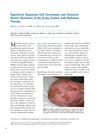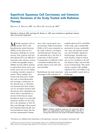4 citations,
February 2023 in “Frontiers in Oncology” Nano-Pulse Stimulation™ Therapy is more effective and less damaging than cryoablation for treating melanoma tumors in mice.
2 citations,
February 2018 in “Journal of bone oncology” Low-dose chemotherapy is safer, more effective, and cost-effective than surgery for treating bone lesions in children.
 35 citations,
January 2012 in “The Journal of Sexual Medicine”
35 citations,
January 2012 in “The Journal of Sexual Medicine” Androgen Deprivation Therapy for prostate cancer often reduces sexual function but intermittent therapy may be more tolerable.
 19 citations,
October 1994 in “Tumori Journal”
19 citations,
October 1994 in “Tumori Journal” As of 1994, treatments for liver cancer had not significantly improved patient survival.
 November 2022 in “CARDIOMETRY”
November 2022 in “CARDIOMETRY” A group has developed therapies that show promise for treating cancer and various other conditions.
 May 2022 in “Gastroenterology”
May 2022 in “Gastroenterology” Targeting NETs may help reduce fibrosis in Crohn's disease.
 411 citations,
April 2010 in “Gastroenterology”
411 citations,
April 2010 in “Gastroenterology” Targeting colon cancer stem cells might lead to better treatment results.
 2 citations,
May 2017 in “The Journal of Dermatology”
2 citations,
May 2017 in “The Journal of Dermatology” A Japanese bone marrow transplant patient developed a rare skin cancer possibly linked to long-term use of the medication voriconazole.
 275 citations,
March 1999 in “Journal of The American Academy of Dermatology”
275 citations,
March 1999 in “Journal of The American Academy of Dermatology” Chemotherapy can cause various skin reactions, with hair loss being the most common, and proper diagnosis and treatment of these reactions are important.
 131 citations,
October 2004 in “Clinical Cancer Research”
131 citations,
October 2004 in “Clinical Cancer Research” Tempol is safe and may prevent hair loss from brain radiotherapy.
 75 citations,
January 2014 in “Korean Journal of Urology”
75 citations,
January 2014 in “Korean Journal of Urology” 5α-reductase inhibitors can cause sexual problems, higher risk of aggressive prostate cancer, and depression.
 55 citations,
November 2004 in “Expert opinion on drug safety”
55 citations,
November 2004 in “Expert opinion on drug safety” Chemotherapy often causes hair loss, nail changes, and mouth issues, but these are usually manageable.
 44 citations,
April 2006 in “Expert opinion on drug safety”
44 citations,
April 2006 in “Expert opinion on drug safety” Gefitinib can cause skin problems, diarrhea, and nausea, but rarely causes severe lung disease or hair loss.
 16 citations,
February 2019 in “Pediatric Blood & Cancer”
16 citations,
February 2019 in “Pediatric Blood & Cancer” Most children with CNS tumors on targeted therapy had skin reactions, which were generally treatable without stopping the therapy.
 8 citations,
January 2003 in “Pharmacotherapy: The Journal of Human Pharmacology and Drug Therapy”
8 citations,
January 2003 in “Pharmacotherapy: The Journal of Human Pharmacology and Drug Therapy” Chemotherapy may cause recurring hair loss due to an autoimmune response.
 5 citations,
May 2006 in “Dermatologic Surgery”
5 citations,
May 2006 in “Dermatologic Surgery” Radiation therapy successfully treated an elderly man's skin cancer and pre-cancerous scalp lesions.
 5 citations,
September 2002 in “Archives of Dermatology”
5 citations,
September 2002 in “Archives of Dermatology” Dermatologists diagnose and manage melanoma more effectively than general practitioners.
 2 citations,
July 2014 in “Irish Journal of Medical Science”
2 citations,
July 2014 in “Irish Journal of Medical Science” The meeting discussed medical findings, including benefits of certain treatments for cancer and heart conditions, and highlighted issues like poor adherence to preventive measures and skill gaps among interns.
 1 citations,
November 2018 in “Elsevier eBooks”
1 citations,
November 2018 in “Elsevier eBooks” The document concludes that transplantology has evolved with improved techniques and materials, making transplants more successful and expanding the types of transplants possible.
 January 2015 in “Springer eBooks”
January 2015 in “Springer eBooks” Hormones affect skin aging, and treatments targeting hormonal balance may improve skin health.
 August 2008 in “Current Opinion in Internal Medicine”
August 2008 in “Current Opinion in Internal Medicine” In 2007, prostate cancer research improved understanding of risk, diagnosis, and treatment, but also showed heart risks with certain therapies and the need for personalized care.
 May 2006 in “Dermatologic Surgery”
May 2006 in “Dermatologic Surgery” Radiation therapy successfully treated an elderly man's skin cancer and pre-cancerous scalp lesions.
 438 citations,
October 2010 in “Oncogene”
438 citations,
October 2010 in “Oncogene” Keratins help protect cells, aid in cancer diagnosis, and influence cancer behavior and treatment.
 281 citations,
January 2013 in “British Journal of Dermatology”
281 citations,
January 2013 in “British Journal of Dermatology” Manage vitiligo with treatments, address emotions, and use camouflage techniques.
 192 citations,
January 2015 in “Journal of the American Academy of Dermatology”
192 citations,
January 2015 in “Journal of the American Academy of Dermatology” Targeted cancer therapies often cause serious skin problems that need careful management.
 116 citations,
May 1992 in “The American Journal of Medicine”
116 citations,
May 1992 in “The American Journal of Medicine” Flutamide rarely causes liver toxicity in prostate cancer patients.
 67 citations,
February 2015 in “Life Sciences”
67 citations,
February 2015 in “Life Sciences” Some plant-based treatments can help with benign prostatic hyperplasia symptoms, but more research is needed to confirm their safety and effectiveness.
 59 citations,
February 2021 in “Advanced Functional Materials”
59 citations,
February 2021 in “Advanced Functional Materials” The silk fibroin-based hydrogel shows promise for treating melanoma and healing infected wounds by killing tumor cells and bacteria, and supporting skin recovery.
 40 citations,
April 1999 in “Drugs”
40 citations,
April 1999 in “Drugs” Finasteride treats enlarged prostate, improves urinary flow, but may cause sexual side effects.
 25 citations,
November 2013 in “Journal of the American Academy of Dermatology”
25 citations,
November 2013 in “Journal of the American Academy of Dermatology” Many patients on new leukemia drugs had mild to moderate skin reactions.



























